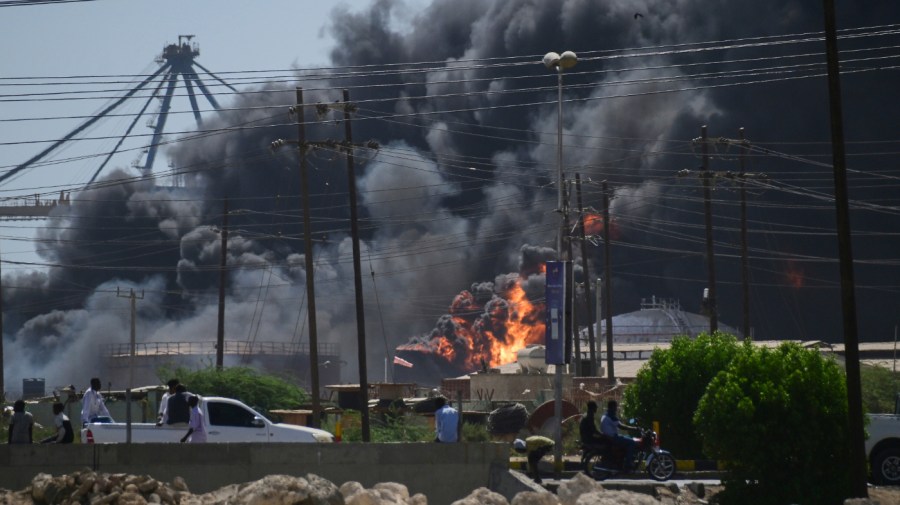World
Urgent Actions Needed to Prevent Genocide in Sudan

The potential for genocide in Sudan has escalated significantly over the past year and a half, prompting urgent calls for action from the international community. As violence surges, particularly in regions like Darfur and Khartoum, the options for intervention have become more limited. Former President Donald Trump faces a critical moment in addressing this crisis, as the world watches closely to see if he can leverage American influence effectively.
The ongoing conflict in Sudan has led to a humanitarian disaster. Reports indicate that thousands have died, and millions are displaced, raising alarms among human rights organizations like Human Rights Watch. The situation is compounded by the deteriorating political landscape, which has resulted in a power vacuum and rampant violence. The United Nations has described the conditions as dire, with a high risk of ethnic cleansing if no action is taken.
The international response is hampered by several factors, including the shifting dynamics within the African Union and competing interests among global powers. In January 2022, the UN Security Council faced significant challenges in reaching a consensus on further measures to stabilize the region. With the situation worsening, the need for a coordinated effort becomes increasingly urgent.
Global Implications and Strategic Approaches
The implications of genocide in Sudan extend far beyond its borders, affecting regional stability and international relations. Neighboring countries are already feeling the ripple effects, as waves of refugees seek safety. This humanitarian crisis could destabilize the entire region, prompting a larger international response.
To prevent further escalation, a multifaceted approach is necessary. First, enhancing diplomatic engagement with Sudanese leaders is crucial. The International Criminal Court has previously issued warrants for individuals accused of war crimes in the region. Renewed pressure on these leaders could deter further violence and promote accountability.
Additionally, international sanctions should be considered against entities that contribute to the violence. Targeting financial networks that fund armed groups could disrupt their operations and reduce the conflict’s intensity. Collaborating with regional partners, including the African Union, is vital to ensure a united front against the atrocities occurring in Sudan.
Furthermore, humanitarian aid must be prioritized to alleviate suffering. Immediate assistance to displaced populations can help stabilize the situation and reduce the risk of further violence. The international community must work collectively to provide resources and support to organizations on the ground to deliver crucial aid effectively.
Challenges Ahead and the Role of the United States
The challenges are immense, as diplomatic efforts may face resistance from entrenched interests within Sudan. Nonetheless, the role of the United States remains pivotal. The Biden administration has indicated a commitment to addressing global human rights issues, and Sudan presents a critical test of this policy.
If Donald Trump chooses to engage proactively, he could leverage America’s influence to rally support from allies and pressure adversaries. A concerted effort from the U.S. could inspire other nations to act, creating a coalition aimed at preventing genocide.
The path forward is fraught with obstacles, but the stakes are too high for the global community to remain passive. The situation in Sudan demands urgent and decisive action to avert a tragedy that could have devastating consequences for millions. As the international community reflects on its options, the time to act is now.
-

 Politics3 weeks ago
Politics3 weeks agoHamas Chief Stresses Disarmament Tied to Occupation’s End
-

 Science3 weeks ago
Science3 weeks agoOhio State Study Uncovers Brain Connectivity and Function Links
-

 Entertainment3 weeks ago
Entertainment3 weeks agoMegan Thee Stallion Exposes Alleged Online Attack by Bots
-

 Science4 weeks ago
Science4 weeks agoResearchers Challenge 200-Year-Old Physics Principle with Atomic Engines
-

 World2 weeks ago
World2 weeks agoFDA Unveils Plan to Cut Drug Prices and Boost Biosimilars
-

 Entertainment3 weeks ago
Entertainment3 weeks agoPaloma Elsesser Shines at LA Event with Iconic Slicked-Back Bun
-

 Top Stories3 weeks ago
Top Stories3 weeks agoFederal Agents Detain Driver in Addison; Protests Erupt Immediately
-

 Business3 weeks ago
Business3 weeks agoMotley Fool Wealth Management Reduces Medtronic Holdings by 14.7%
-

 Entertainment2 weeks ago
Entertainment2 weeks agoBeloved Artist and Community Leader Gloria Rosencrants Passes Away
-

 Business3 weeks ago
Business3 weeks agoHome Depot Slashes Prices on Halloween Favorites Up to 75%
-

 Politics4 weeks ago
Politics4 weeks agoNHP Foundation Secures Land for 158 Affordable Apartments in Denver
-

 Top Stories3 weeks ago
Top Stories3 weeks agoOrioles Hire Craig Albernaz as New Manager Amid Rebuild









